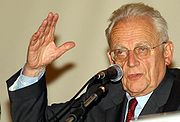
Alain Touraine
Encyclopedia

France
The French Republic , The French Republic , The French Republic , (commonly known as France , is a unitary semi-presidential republic in Western Europe with several overseas territories and islands located on other continents and in the Indian, Pacific, and Atlantic oceans. Metropolitan France...
sociologist
Sociology
Sociology is the study of society. It is a social science—a term with which it is sometimes synonymous—which uses various methods of empirical investigation and critical analysis to develop a body of knowledge about human social activity...
born in Hermanville-sur-Mer
Hermanville-sur-Mer
Hermanville-sur-Mer is a commune in the Calvados department in the Basse-Normandie region in northwestern France.-Population:-Sights:* 13th century church* Commonwealth war cemetery* Old village center...
. He is research director at the École des Hautes Études en Sciences Sociales
École des Hautes Études en Sciences Sociales
The École des hautes études en sciences sociales is a leading French institution for research and higher education, a Grand Établissement. Its mission is research and research training in the social sciences, including the relationship these latter maintain with the natural and life sciences...
, where he founded the Centre d'étude des mouvements sociaux (see also Daniel Bertaux
Daniel Bertaux
Daniel Bertaux is a French sociologist who is best known of initiating a research approach to use and study biographies in sociology. A second important field of study has been social mobility from which he moved into life histories as a "better" approach to study the personal destinies of people...
). He is best known for being the originator of the term "post-industrial society
Post-industrial society
If a nation becomes "post-industrial" it passes through, or dodges, a phase of society predominated by a manufacturing-based economy and moves on to a structure of society based on the provision of information, innovation, finance, and services.-Characteristics:...
". His work is based on a "sociology of action," and believes that society shapes its future through structural mechanisms and its own social struggles. Touraine defined historicity as the capability of a society to take action upon itself, see The Self-Production of Society (1977).
His key interest for most of his career has been with social movements. He has studied and written extensively on workers' movements across the world, particularly in Latin America
Latin America
Latin America is a region of the Americas where Romance languages – particularly Spanish and Portuguese, and variably French – are primarily spoken. Latin America has an area of approximately 21,069,500 km² , almost 3.9% of the Earth's surface or 14.1% of its land surface area...
and more recently in Poland
Poland
Poland , officially the Republic of Poland , is a country in Central Europe bordered by Germany to the west; the Czech Republic and Slovakia to the south; Ukraine, Belarus and Lithuania to the east; and the Baltic Sea and Kaliningrad Oblast, a Russian exclave, to the north...
where he observed and aided the birth of Solidarnosc (Solidarity), see Solidarity: The Analysis of a Social Movement (1983). While in Poland, he developed the research method of "Sociological Intervention," which had been outlined in "The Voice and the Eye" (La Voix et le Regard) [1981].
Touraine has gained immense popularity in Latin America as well as in continental Europe
Europe
Europe is, by convention, one of the world's seven continents. Comprising the westernmost peninsula of Eurasia, Europe is generally 'divided' from Asia to its east by the watershed divides of the Ural and Caucasus Mountains, the Ural River, the Caspian and Black Seas, and the waterways connecting...
. Yet he has failed to gain anywhere near the same recognition in the English-speaking world. Out of twenty or so books, only about half of them have been translated into English.
He participated in 1969 at MoMA's Universitas project organized by Argentine architect Emilio Ambasz. In 2010, he was jointly awarded, with Zygmunt Bauman
Zygmunt Bauman
Zygmunt Bauman is a Polish sociologist who, since 1971, has resided in England after being driven out of Poland by an anti-Semitic campaign, engineered by the Communist government which he had previously supported...
, the Príncipe de Asturias Prize for Communication and the Humanities.
Selected publications
- Touraine, A. (1971). The Post-Industrial Society. Tomorrow's Social History: Classes, Conflicts and Culture in the Programmed Society. New York: Random House.
- Touraine, A. (1977). The self-production of society. Chicago: The University of Chicago Press.
- Touraine, A. (1981). The voice and the eye: An analysis of social movements. Cambridge: Cambridge University Press.
- “A Social Movement: Solidarity”. Telos 53 (Fall 1982). New York: Telos Press.
- "Chapter 9: Society Turns Back Upon Itself." The Blackwell Reader in Contemporary Social Theory. Ed. Anthony Elliott. New York: John Wiley & Sons, Incorporated, 1999.
- Touraine, A. (2000). Can we live together?: Equality and difference. Stanford, Calif.: Stanford University Press.
- Touraine, A. (2006). Le monde des femmes. Paris: Fayard.

